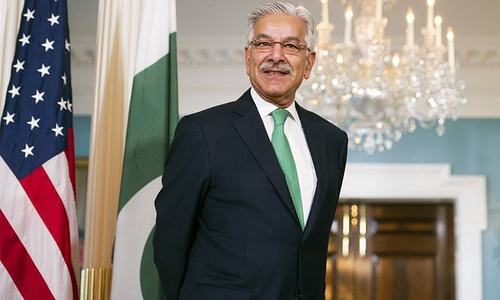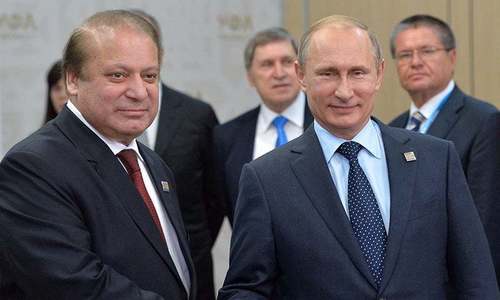ISLAMABAD: Confusion about whether or not Pakistan has been put on a ‘grey list’ by the Financial Action Task Force (FATF) continued on Friday as a public statement by the international watchdog announcing the outcomes of its plenary session held in Paris this week remained silent on the US move to put the country on the watchlist.
Pakistan does not feature on the list of countries with strategic deficiencies posing a risk to the international financial system issued along with the FATF statement following the meeting.
The list now features nine countries Ethiopia, Yemen, Iraq, Syria, Serbia, Sri Lanka, Trinidad and Tabago, Vanuatu and Tunisia, while Bosnia and Herzegovina has been moved to the white list.
Islamabad set to be ‘grey listed’ in June after US succeeds in persuading China and Saudi Arabia to drop their opposition in second vote
The absence of Pakistan’s name from the list of “Jurisdictions with strategic anti-money laundering / countering the financing of terrorism deficiencies for which they have developed an action plan with the FATF”, posted on the official website of the watchdog following the plenary session, indicates that Pakistan has apparently survived the attempt to put it on the watchlist that could have had serious economic repercussions for the country.
However, a top official privy to the development confirmed to Dawn that the US succeeded in calling a second vote on Thursday night for its motion to ‘grey list’ Pakistan at the FATF plenary meeting during which China and the Kingdom of Saudi Arabia changed their earlier stance by remaining silent. The only country left opposing the motion was Turkey which was indicated by a statement shared by Interior Minister Ahsan Iqbal on Twitter. “Thank you Turkey for standing with Pakistan against all odds and proving that we are one. We are proud to have a brother like you.”
An earlier discussion on the motion, held on Tuesday, saw opposition from China, Turkey and Saudi Arabia, causing the motion to fail.
Back in Pakistan, the government remained silent on the matter as confusion prevailed throughout the day following reports in Indian media that Pakistan had indeed been grey listed, despite Foreign Minister Khwaja Asif’s claims shared over twitter that the country had earned a three-month reprieve. Those reports were followed by more in the international media claiming the same thing, and sourcing their information to highly placed diplomats directly in the know.
But the statement released by FATF following the plenary meetings later in the evening made no mention of Pakistan, fuelling the confusion and talk that these stories were all wrong.
Later in the evening, Adviser to the Prime Minister on Finance, Miftah Ismail, who has been leading Pakistan’s diplomacy to defeat the motion sponsored by the US went on air to confirm that the motion had indeed passed. This happened following an extraordinary second vote that the US managed to arrange on Thursday night, two days after the motion had been defeated in the first round of discussion, a top official confirmed to Dawn.
Pakistan is now set to be ‘grey listed’ by FATF in June, meaning its financial system will be designated as posing a risk to the international financial system because of “strategic deficiencies” in its ability to prevent terror financing and money laundering. In the meantime, the government will work with FATF to build an “action plan” to plug the deficiencies identified by the watchdog, which will be put up for approval by consensus in the June session. After that, implementation of the plan will begin, monitored by the Asia Pacific Group, a part of the global FATF network.
If there is a failure to build consensus on the action plan, Pakistan could be black listed by FATF, a status currently applied only to Iran and North Korea.
The country spent three years on the grey list between 2012 and 2015, without the designation affecting its ability to float international bonds, borrow from multilateral bodies, receive or send remittances or conduct international trade.
The status does little more than raising the compliance burden on counterparts, such as correspondent banks, dealing with entities within Pakistan’s financial system, and therefore attaches an additional cost to many external sector transactions.
The US and the UK had jointly moved the FATF nominating Pakistan for placement on the “grey list” and were subsequently joined by France and Germany. The accusation against Pakistan was that it had not taken action on some of the entities and individuals designated as terrorists by the UN Security Council Resolution 1267. More specifically the concern was about Jamaat-ud-Dawa and Falah-i-Insaniyat Foundation being allowed to operate in the country, and Hafiz Saeed being free to organise rallies and raise funds.
Pakistan believes that the move was politically motivated.
“Pakistan has serious concerns over and objections to the introduction of this new “nomination” procedure, which is unprecedented and in clear violation of established rules/practices of FATF. Most of the concerns raised by the US side regarding deficiencies in our CFT/AML regime had already been addressed in 2015 when Pakistan got an exit from the grey list,” said FO spokesman Dr Mohammad Faisal.
Days before the FATF meeting, Pakistan took important policy decisions by amending the anti-terror legislation through a presidential ordinance to include all UN-listed individuals and groups in the national listings of proscribed outfits and persons.
Similarly, an announcement was made to deploy troops in Saudi Arabia to meet a key demand of the kingdom in an effort to get the crucial Gulf Cooperation Council vote at the FATF. The diplomatic outreach was commenced to foil the Western bid believed to have been made at India’s behest. A report of actions taken by Pakistan government to comply with FATF requirements was also presented at the Paris plenary.
While the foreign minister on Tuesday night, after the first discussion of the motion, sent a celebratory tweet announcing a three-month pause on the US-led move, in which he thanked the countries which supported Pakistan, by Thursday everything had changed.
Published in Dawn, February 24th, 2018












































